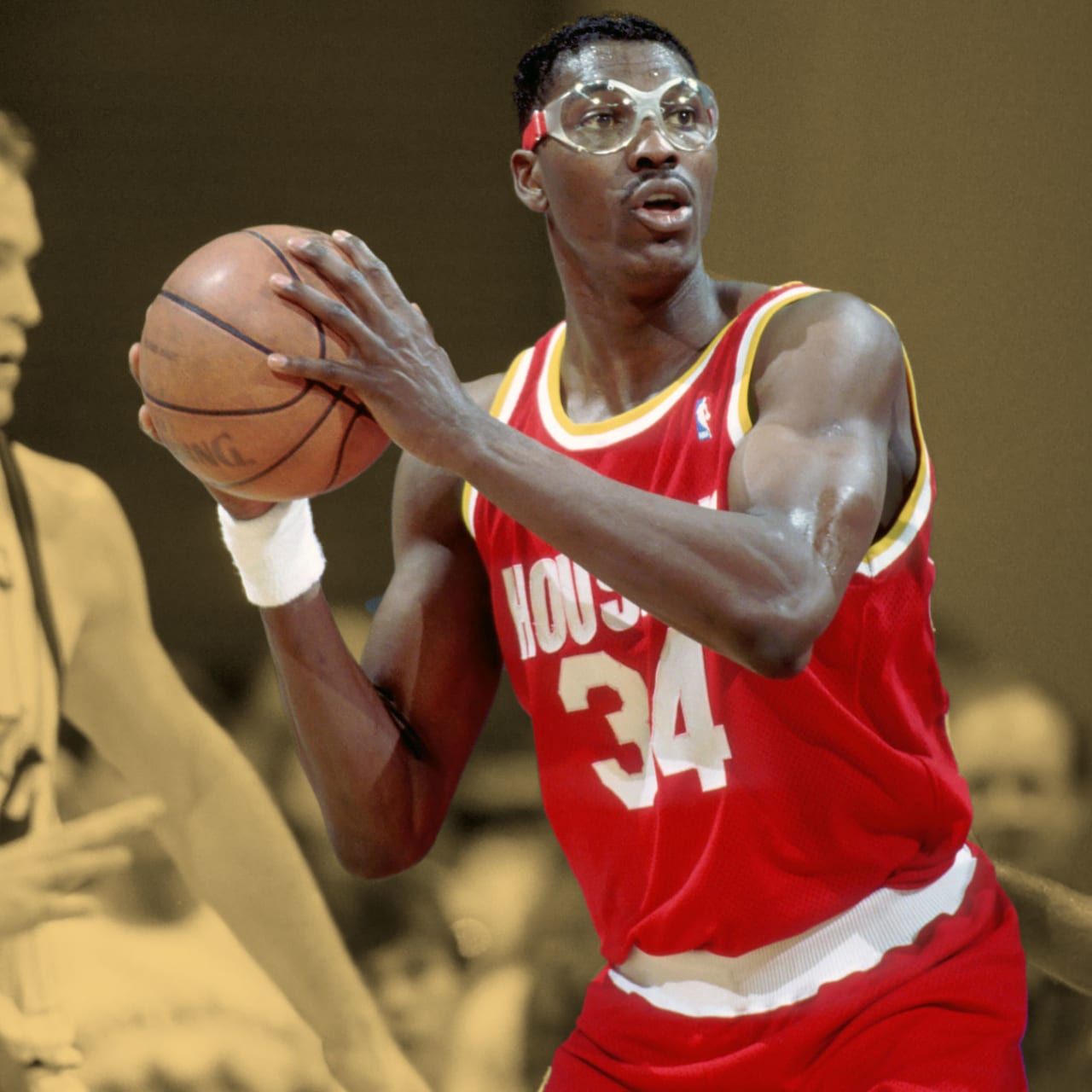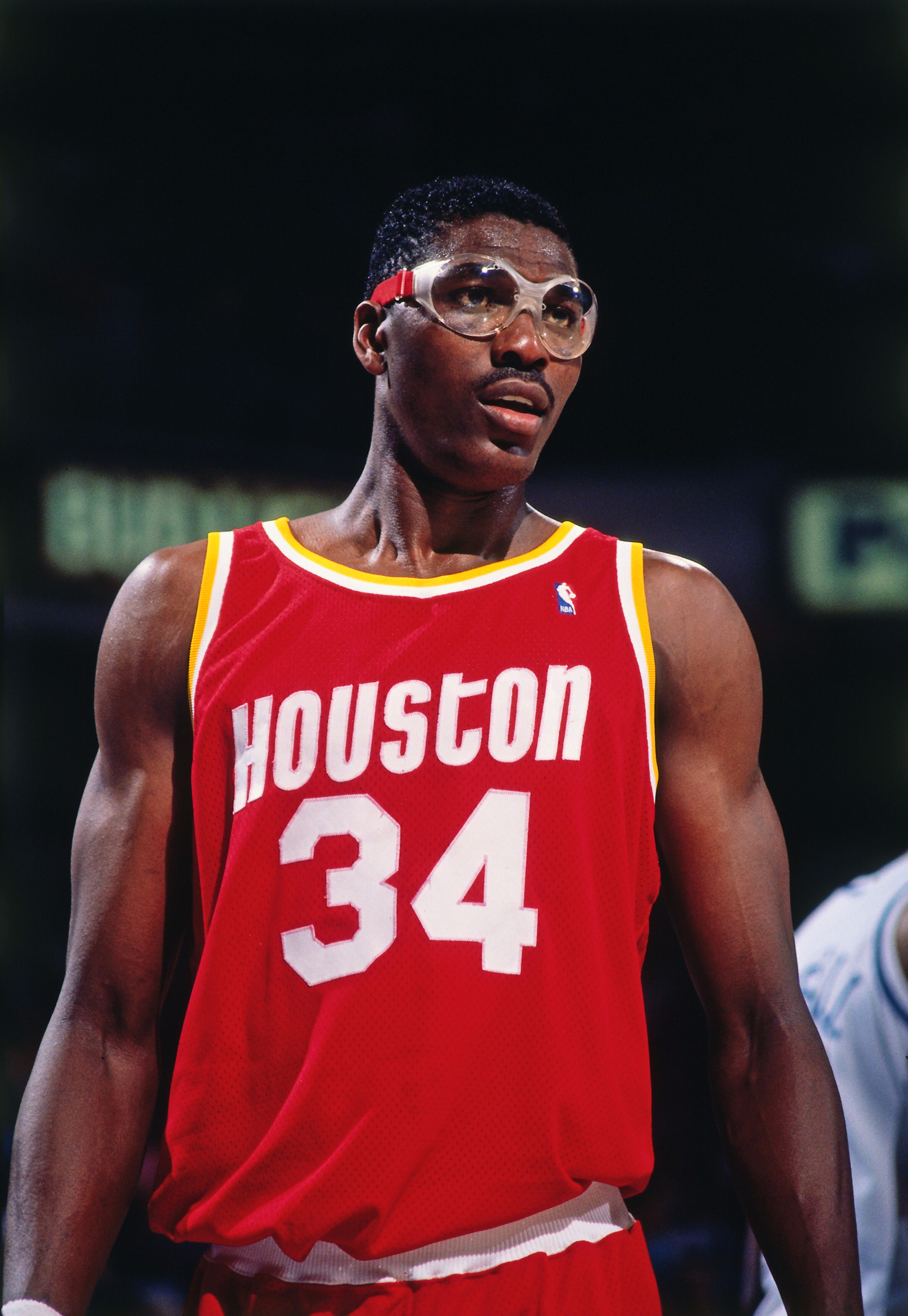Hakeem Olajuwon (Part 2)
Hakeem Olajuwon (Part 2)

Hakeem Olajuwon made an immediate impact in his rookie season with the Houston Rockets, teaming up with Ralph Sampson to form the original NBA "Twin Towers" duo. The Rockets' win-loss record improved significantly from the previous season, finishing with a record of 48-34. Olajuwon's remarkable rookie performance earned him averages of 20.6 points, 11.9 rebounds, and 2.68 blocks per game. Despite his stellar performance, he finished as the runner-up to Michael Jordan in the 1985 Rookie of the Year voting.
In his second season, Olajuwon continued to excel, averaging 23.5 points, 11.5 rebounds, and 3.4 blocks per game. The Rockets improved even further, finishing the season with a record of 51-31. In the playoffs, they made a stunning run to the Western Conference Finals, where they faced the defending champion Los Angeles Lakers. The Rockets emerged victorious, winning the series four games to one, with Olajuwon's standout performances earning him recognition on the cover of Sports Illustrated. He scored a total of 75 points in victories in games three and four of the series.
Despite their impressive playoff run, the Rockets fell short in the 1986 NBA Finals, losing in six games to the Boston Celtics. The Celtics' 1986 team is widely regarded as one of the best teams in NBA history. Nonetheless, Olajuwon's remarkable performance throughout the playoffs solidified his reputation as one of the league's top players, setting the stage for his future success in the NBA.
During the 1987–88 season, Hakeem Olajuwon took on the role of the Houston Rockets' undisputed leader following Ralph Sampson's trade to the Golden State Warriors. Under new coach Don Chaney, Olajuwon led the league in rebounds with an average of 13.5 per game, along with impressive averages of 24.8 points and 3.4 blocks per game. Despite his outstanding performance, the Rockets were eliminated in the first round of the playoffs by the Seattle SuperSonics.
The following season, the Rockets finished with a 41-41 record and were eliminated in four games in the playoffs by the Los Angeles Lakers. However, Olajuwon continued to showcase his defensive prowess, leading the league in rebounds with 14.0 per game and blocks with 4.6 per game. He became the only player since the NBA started recording blocked shots to average over 14 rebounds and 4.5 blocks per game in a single season. Olajuwon also recorded a quadruple-double during the season, making him only the third player in NBA history to achieve this feat.
In the 1990–91 season, under Coach of the Year Don Chaney, the Rockets finished with a 52-30 record. Although Olajuwon averaged 21.8 points per game, an injury to his eye socket caused by an elbow from Bill Cartwright limited his playing time, preventing him from qualifying for the rebounding title. Despite this setback, he led the league in blocks with 3.95 per game. However, the Rockets were swept in the playoffs by the LA Lakers.
The following season marked a low point for the Rockets, as they finished with a 42-40 record and missed the playoffs for the first time in Olajuwon's career. Despite Olajuwon's consistent strong performances, he expressed dissatisfaction with the organization's efforts to surround him with quality players and requested a trade. However, he remained with the team, and under new coach Rudy Tomjanovich in the 1992–93 season, Olajuwon's improved passing skills led to a career-high of 3.5 assists per game. He also set a new career-high in scoring with 26.1 points per game. The Rockets achieved a franchise-record 55 wins and advanced to the second round of the playoffs before losing to the Seattle SuperSonics in a closely contested seventh game.
Hakeem Olajuwon's performances during the 1993–94 and 1994–95 seasons solidified his reputation as one of the greatest centers in NBA history. During this period, he showcased his skills against formidable opponents such as Patrick Ewing, David Robinson, Shaquille O'Neal, Dikembe Mutombo, Dennis Rodman, and Karl Malone.
In the 1994 NBA Finals against the New York Knicks, Olajuwon led the Houston Rockets to victory in a hard-fought seven-game series. Despite being down 2–1, the Rockets rallied to win the championship. Olajuwon's clutch play, including a game-saving block in Game 6 and a stellar performance in Game 7, earned him the NBA Finals Most Valuable Player award. He outplayed Patrick Ewing throughout the series, averaging 26.9 points per game on 50% shooting compared to Ewing's 18.9 points per game.
The following season, despite a slow start and Olajuwon missing eight games due to anemia, the Rockets repeated as champions in 1995. Olajuwon's performance in the playoffs was particularly memorable, especially in the Conference Finals against the San Antonio Spurs, where he outplayed league MVP David Robinson. Olajuwon's dominance continued in the NBA Finals against the Orlando Magic, led by Shaquille O'Neal. Olajuwon outscored O'Neal in every game of the series and was once again named Finals MVP. He averaged 33.0 points, 10.3 rebounds, and 2.81 blocks during the 1995 playoffs.
In 1994, Olajuwon achieved a historic milestone by becoming the only player in NBA history to win the MVP, Championship, Finals MVP, and Defensive Player of the Year awards in the same season. He was also the first foreign-born player to win the league's MVP award. Throughout these two seasons, Olajuwon's exceptional performance cemented his status as one of the greatest players in NBA history.
References
- "Hakeem Encyclopedia C-D". NBA.com. Archived from the original on December 21, 2016. Retrieved June 30, 2021.
- a b Basketball – Cougar Style Archived December 8, 2008, at the Wayback Machine, uhcougars.cstv.com, accessed January 3, 2007.
- ^ Career Summaries of the First 56 Final Four Most Outstanding Players Archived October 26, 2006, at the Wayback Machine, collegesportingnews.com, accessed January 3, 2007.
- ^ Bender, Jack (June 29, 1983). "It's summer—and basketball is back". Waterloo Courier. p. B-1. Retrieved December 5, 2020 – via Newspapers.com. And only the Athletic Foundation funded by First Interstate Bank (formerly the Helms awards) picked Akeem Abdul Olajuwon of NCAA runnerup Houston as its player of the year.
- ^ "Hakeem Olajuwon | Biography, Stats, & Facts | Britannica". www.britannica.com. January 17, 2024. Retrieved February 21, 2024.
- a b Smith, Sam. Draft deal stranger than '1984' Archived June 13, 2013, at the Wayback Machine, The Chicago Tribune, June 26, 2007, accessed March 24, 2013.
- ^ NBA & ABA Playoff Index Archived March 20, 2019, at the Wayback Machine, basketball-reference.com, accessed March 24, 2013.
- Houston Rockets page Archived August 12, 2015, at the Wayback Machine, databasebasketball.com, accessed January 2, 2007.
- a b Hakeem Olajuwon stats Archived December 14, 2007, at the Wayback Machine, nba.com, accessed January 28, 2007.
- ^ Simmons. pg. 192
- ^ Top 10 teams in NBA History Archived May 2, 2013, at the Wayback Machine, nba.com/history, accessed January 3, 2007.
- Hakeem Olajuwon Archived December 8, 2006, at the Wayback Machine databasebasketball.com, accessed January 3, 2007.
- a b c Hakeem Olajuwon's page at nba.com Archived May 16, 2008, at the Wayback Machine, nba.com, accessed January 3, 2007.
- ^ Milwaukee Bucks at Houston Rockets, March 29, 1990 Archived October 1, 2007, at the Wayback Machine, basketball-reference.com, accessed January 26, 2007.
- a b Hakeem Olajuwon Archived May 25, 2012, at the Wayback Machine, basketball-reference.com, accessed November 5, 2010.




































